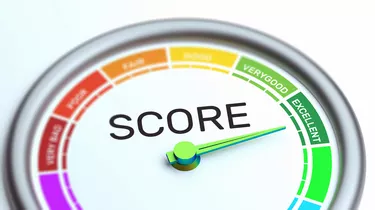
Credit scores have a significant impact on everyone's finances. Lenders use credit scores to determine who gets a loan. Insurance companies use credit scores to decide how much to charge clients for auto and homeowners insurance. Cell phone providers base the cost of their plans on your credit score, and utility companies will ask you for larger deposits if you have a low credit score.
So, how can you use your credit score to improve your finances?
Video of the Day
Video of the Day
How Credit Affects Your Finances
Take an auto loan, for example. Auto buyers with excellent credit will get lower interest rates, maybe even 3 percent in today's market, for those with excellent credit scores of 750 and above. On the other hand, borrowers with lower credit scores, like 600 and below, could be paying closer to 10 percent.
If you had a car loan of $40,000 payable over seven years at an interest rate of 3 percent, you would pay a total interest cost of $4,397. if you had a lower credit score and had to pay 10 percent for the same loan, your total interest paid would be $15,870. This is a difference of $11,473.
This additional interest cost of $11,473 is money that you could have used to put in your savings account or build up a down payment for a house. Instead, it was used to pay interest because of a low credit score.
From these calculations, you can see the impact a bad credit score can have on your personal finance.
Consider also: How to Pick the Best Credit Cards in 2022
What's in a Credit Score?
Here are the five factors that make up a credit score and their weight:
- Payment history: 35 percent
- Utilization of available credit card debt: 30 percent
- Average age of accounts: 15 percent
- Mix of debts: 10 percent
- New accounts: 10 percent
Generally, these are the categories of credit scores:
- Excellent: 720 and above
- Good: 690 to 719
- Fair: 630 to 689
- Poor: 300 to 629
Each of the three major credit bureaus — Experian®, Equifax® and TransUnion® — start with the Fair Isaac Corporation (FICO) algorithm, but have distinct credit scoring models that weigh each of the factors differently. So, you'll see slight differences in the classifications of these scores.
Improving Your Credit Score
You don't have to carry a low credit score all your life. There are steps you can actively take to build credit to improve your score and strengthen your financial health.
Payment history: Paying all your bills on time is the most important factor in your credit score. Never have a delinquency of 30 or 60 days or more. Late payments will stay on your credit report for up to seven years. Look at your schedule of due dates for bill payment, and make sure you always have enough cash in your bank account to cover them. For added security, you could set up your bills with automatic payments.
Credit utilization rate: If you have credit card lines that total $6,000, and you owe $3,600, your credit utilization ratio is 60 percent. The goal is to keep this ratio to 30 percent or less. It's best to keep your credit utilization under 10 percent. If any of your credit card companies give you a credit limit increase, and you keep the same credit card balances, your utilization ratio will go down.
Length of accounts: It'll take time to build up a credit history of older accounts with a consistent record of on-time payments. Continue to use your existing accounts responsibly and pay down the balances. You can strengthen this factor by having another person with a good credit score and older account histories add you as an authorized user. Their good records will bolster your score.
Mix of credit accounts: You'll get points added to your credit score if you have a mix of types of credit that include credit cards, installment loans, student loans and mortgages.
New accounts: Don't apply or open a new credit card account. Each new credit application will create a hard inquiry that will temporarily lower your credit score.
Consider also: 3 Ways to Improve Your Credit Score
You can begin to improve your financial well-being by getting your latest FICO score from annualcreditreport.com. It's a free credit report. With this information, you can review your credit file and see which elements of your credit score need improvement and start to develop a plan to improve your overall credit. For example, one immediate goal for credit repair might be to begin reducing any high balances outstanding on your credit cards.